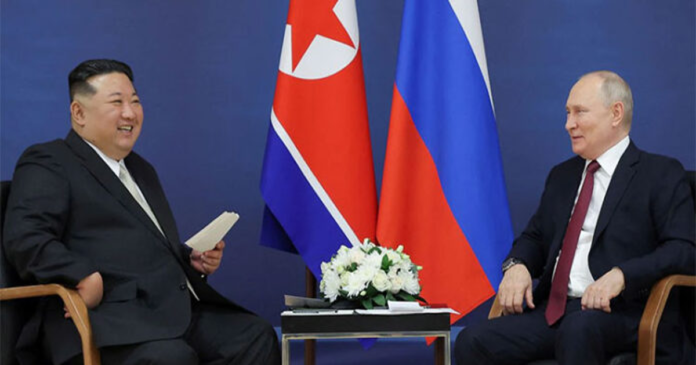Whatever tangible collaboration comes out of this week’s summit between North Korean leader Kim Jong Un and Russian President Vladimir Putin, observers believe it is intended to serve as a warning to their enemies.
Putin and Kim send warning: On Wednesday, after Putin showed Kim Jong Un through Russia’s most cutting-edge space launch facility and the two men met with their respective defence ministers, they toasted their relationship by addressing one another as “comrade.”
The two nations want to show that they can still rely on one another despite their geopolitical isolation. Additionally, both aim to undermine pressure and punishment campaigns undertaken by the United States against North Korea for its missile and nuclear programmes as well as sanctions against Russia over the conflict in Ukraine.
According to Duyeon Kim of the Centre for a New American Security, “Putin and Kim would both benefit from a transactional bargain, but they would also gain geopolitically by giving the appearance that their nuclear-armed nations are cooperating militarily and sending a warning about potential consequences to America’s allies and like-minded partners that support Ukraine.”
Kim Jong Un would also be sending a message to Tokyo, Seoul, and Washington that Russia is on his side in Northeast Asia.
The presidents of Russia and North Korea agreed to expand their defence cooperation, and Putin pledged that Russia would assist the North in developing satellites, despite both nations’ denials of U.S. allegations that they want to supply each other with weapons.
“Analysis of Putin-Kim Summit: Challenging International Order and Nuclear Diplomacy Implications”
According to Leif-Eric Easley, a professor at Ewha University in Seoul, if the two presidents only intended to negotiate a covert arms sale, they did not need to personally meet.
“He claimed that ‘Putin and Kim’s diplomatic show’ aims to assert success in challenging the U.S.-led international order, avoiding excessive reliance on China, and intensifying pressure on rivals in Ukraine and South Korea.”
According to Andrei Lankov, a Korea researcher at Seoul’s Kookmin University, discussions of any open breach of U.N. Security Council resolutions on North Korea would imply that major international institutions will be paralysed.
He claimed that the summit serves as evidence that all attempts to curb or punish North Korea for its nuclear program—including Security Council resolutions—have failed.
Lankov’s comment suggests that pretty much every major international player, not just Russia, is likely to use this significant precedent of disregarding a UNSC decision if they dislike it.
RUSSIAN FACTOR
Lankov added that it might be unlikely for Russia to give North Korea cutting-edge technology that it would subsequently lose control of. However, he said, it is able to send a clear message to South Korea not to actively offer military aid to Ukraine because of its “excessive” gesturing at defence cooperation.
Despite pressure from Kiev and Washington, South Korea has only supplied non-lethal assistance to Ukraine, sold large quantities of weaponry to Poland, which is next door, and given the US artillery rounds to replenish depleting stocks, all the while maintaining that it has no plans to provide lethal assistance.
It makes natural that, if China, North Korea, and Russia felt threatened, they will want to support one another through alliances or even collaborations to oppose the United States. Mason Richey, a professor at Seoul’s Hankuk University of Foreign Studies, said that each nation has a limited track record of success in forging these kinds of ties.
It’s just hard for me to picture Xi Jinping, Kim Jong Un, and Vladimir Putin being able to trust one another enough to build a true long-term concerted partnership, he said. Even though it could be in their best interests, dictators find it challenging to work together.

